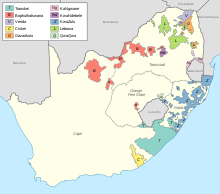Bantustan

A Bantustan (also known as a Bantu homeland, black homeland, black state, or simply homeland) was a territory set aside for South Africa's black inhabitants during apartheid. Ten Bantustans were established in South Africa and ten more in South West Africa (now Namibia), with the goal of creating nation states for the black tribes of Africa. The term Bantustan comes from Bantu (meaning "people" in the Bantu languages) and -stan (meaning "land" in Persian).
The founders of apartheid tried hard to make the Bantustans recognised internationally, but this never happened, and most blacks did not like the Bantustans. They were unpopular because:
- The borders of the Bantustans were drawn to exclude valuable land.
- The large number of reassigned citizens combined with the small size of the Bantustans meant that a lot of people had to share small amounts of land, compared to how people lived in the rest of South Africa.
- Becoming citizens of the new territories meant losing citizenship of South Africa, where the majority of candidates for reassignment of citizenship lived and worked. This would cause them to lose what few rights and privileges they had as citizens of South Africa.
The Bantustans were dissolved in 1994 and their territory incorporated into the Republic of South Africa. From 1994, most parts of the country were redivided into new provinces.
List of Bantustans[change | change source]
Bantustans in South Africa[change | change source]
- Transkei (declared independent on 26 October 1976)
- Bophuthatswana (declared independent on 6 December 1977)
- Venda (declared independent on 13 September 1979)
- Ciskei (declared independent on 4 December 1981)
- Gazankulu
- Lebowa
- QwaQwa
- KaNgwane
- KwaNdebele
- KwaZulu
Lesotho and Swaziland were not Bantustans, but former British colonies granted independence by Great Britain and internationally recognised. Four of the South African Bantustans, Transkei, Bophuthatswana, Venda, and Ciskei (also called the "TBVC States") were granted independence from South Africa, but were never internationally recognised. The other six had a high amount of autonomy.
Bantustans in South West Africa[change | change source]
- Bushmanland
- Damaraland
- East Caprivi (self-rule 1976)
- Hereroland (self-rule 1970)
- Kaokoland
- Kavangoland (self-rule 1973)
- Namaland
- Ovamboland (self-rule 1973)
- Rehoboth
- Tswanaland
Beginning in 1968, ten Bantustans were established in South West Africa. Unlike the Bantustans in South Africa, only four Bantustans in South West Africa were granted autonomy, and none were granted independence. The Bantustans were abolished in May 1989 in the transition to independence.
